The Intel Skylake-X Review: Core i9 7900X, i7 7820X and i7 7800X Tested
by Ian Cutress on June 19, 2017 9:01 AM ESTBenchmarking Performance: CPU Encoding Tests
One of the interesting elements on modern processors is encoding performance. This includes encryption/decryption, as well as video transcoding from one video format to another. In the encrypt/decrypt scenario, this remains pertinent to on-the-fly encryption of sensitive data - a process by which more modern devices are leaning to for software security. Video transcoding as a tool to adjust the quality, file size and resolution of a video file has boomed in recent years, such as providing the optimum video for devices before consumption, or for game streamers who are wanting to upload the output from their video camera in real-time. As we move into live 3D video, this task will only get more strenuous, and it turns out that the performance of certain algorithms is a function of the input/output of the content.
HandBrake H264 and HEVC
As mentioned above, video transcoding (both encode and decode) is a hot topic in performance metrics as more and more content is being created. First consideration is the standard in which the video is encoded, which can be lossless or lossy, trade performance for file-size, trade quality for file-size, or all of the above can increase encoding rates to help accelerate decoding rates. Alongside Google's favorite codec, VP9, there are two others that are taking hold: H264, the older codec, is practically everywhere and is designed to be optimized for 1080p video, and HEVC (or H265) that is aimed to provide the same quality as H264 but at a lower file-size (or better quality for the same size). HEVC is important as 4K is streamed over the air, meaning less bits need to be transferred for the same quality content.
Handbrake is a favored tool for transcoding, and so our test regime takes care of three areas.
Low Quality/Resolution H264: He we transcode a 640x266 H264 rip of a 2 hour film, and change the encoding from Main profile to High profile, using the very-fast preset.
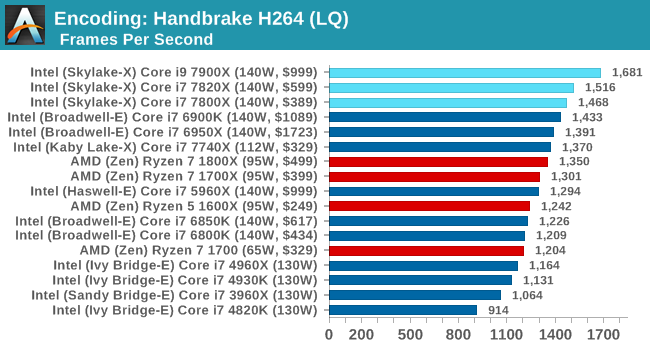
More cores, more frequency, more IPC, more fun: the Core i9-7900X wins here, and even the i7-7800X wins out against the Core i7-6900K.
High Quality/Resolution H264: A similar test, but this time we take a ten-minute double 4K (3840x4320) file running at 60 Hz and transcode from Main to High, using the very-fast preset.
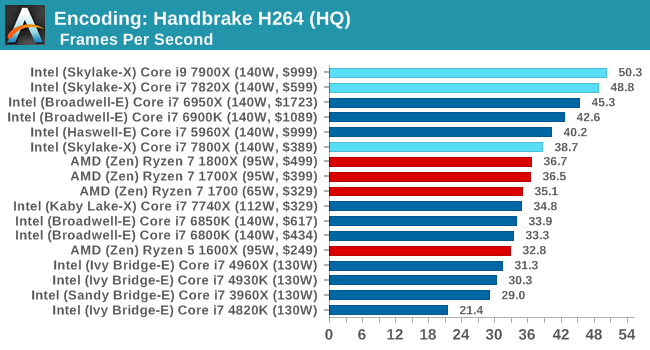
Moving into HQ mode means making the job more parallel, so the higher core counts stay at the top of the chart.
HEVC Test: Using the same video in HQ, we change the resolution and codec of the original video from 4K60 in H264 into 4K60 HEVC.
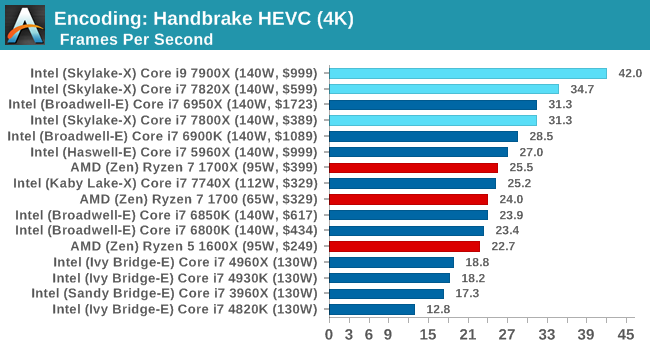
WinRAR 5.40
For the 2017 test suite, we move to the latest version of WinRAR in our compression test. WinRAR in some quarters is more user friendly that 7-Zip, hence its inclusion. Rather than use a benchmark mode as we did with 7-Zip, here we take a set of files representative of a generic stack (33 video files in 1.37 GB, 2834 smaller website files in 370 folders in 150 MB) of compressible and incompressible formats. The results shown are the time taken to encode the file. Due to DRAM caching, we run the test 10 times and take the average of the last five runs when the benchmark is in a steady state.
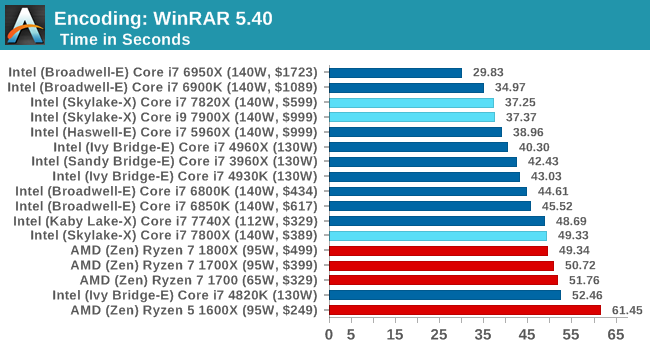
WinRAR loves having access to all the caches as much as possible, to prefetch and store data as needed. The Skylake-X chips fall back a bit here, even with DDR4-2666 support. The Core i7-7800X uses DDR4-2400 memory, so puts it further behind. Interesting didn't realise that the lower core count Broadwell-E chips were affected so much by this test, and the higher core count Ivy Bridge-E parts are faster here.
AES Encoding
Algorithms using AES coding have spread far and wide as a ubiquitous tool for encryption. Again, this is another CPU limited test, and modern CPUs have special AES pathways to accelerate their performance. We often see scaling in both frequency and cores with this benchmark. We use the latest version of TrueCrypt and run its benchmark mode over 1GB of in-DRAM data. Results shown are the GB/s average of encryption and decryption.
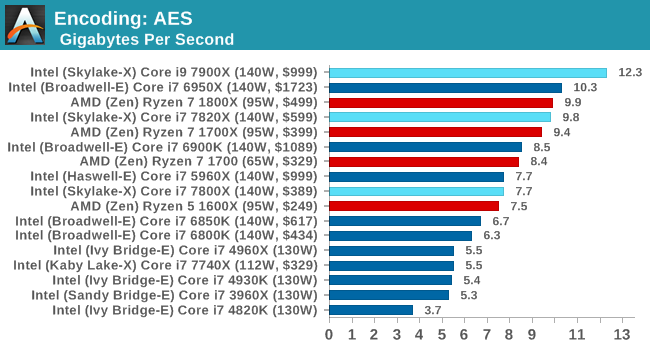
7-Zip
One of the freeware compression tools that offers good scaling performance between processors is 7-Zip. It runs under an open-source licence, is fast, and easy to use tool for power users. We run the benchmark mode via the command line for four loops and take the output score.
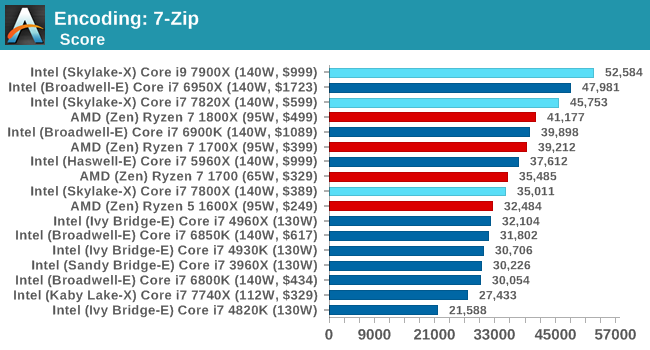










264 Comments
View All Comments
slickr - Tuesday, July 4, 2017 - link
I've been a long time user here and I can SAFELY say you got paid by Intel. How much did they pay you for this ridiculous review?nevcairiel - Monday, June 19, 2017 - link
The Ryzen 7 launch review didn't have gaming benchmarks either.ddriver - Monday, June 19, 2017 - link
That's true, my bad, I didn't remember AT's review in particular, but I remember in most reviews gaming was like 3/4 of the review...Spunjji - Tuesday, June 20, 2017 - link
My thoughts exactly. Not bagging on AT specifically here, just review sites in general. A lot of them are giving out TBD on gaming performance with mentions of it being OK at 4K, whereas with Ryzen it was all "but it games badly at 1080p which people spending $500 on a processor will totally be aiming at".bongey - Wednesday, August 2, 2017 - link
They said it in their conclusion "Gaming Performance, particularly towards 240 Hz gaming, is being questioned,""workstation cpu"
ash9 - Monday, June 19, 2017 - link
Totally agree,I find it disingenuous by this site and many others that there's an INTENTIONAL over look to the fact that the 7900X runs 70W higher (PC Perspective) than the 6950X at load- any blind man could see Intel boosted the clocks on the 7900X for cosmetic benchmark wins and to make this lineup today look relevant. Take the 7900X out of the benches and the lineup today looks anemic. This is the BS that should not go unnoticed
Alexvrb - Monday, June 19, 2017 - link
Reminds me a bit of the pre-Conroe era. Maybe they should have revived the Extreme Edition name...sweetca - Tuesday, June 20, 2017 - link
Some people actually read the reviews here because they are gathering information for an imminent decision.Not everyone wants to wait 3 weeks (maybe delays?), and then to play it safe wait another 3 weeks for the next thing, etc.
I don't post often, but I was surprised how quickly the writer's integrity and honesty were attacked, considering they were making a subjective evaluation; "safe." I guess this is common now.
Timoo - Saturday, July 1, 2017 - link
To be honest: calling the i9 7900X a "safe bet" is not a scientific decision. The platform is far from perfect and the CPU runs hot when OC'd. It has been introduced 2 months in advance of the official release date, to beat TR. To me these 3 facts don't make it a "safe bet", more like a "daring endeavor to save Intel's face".So yes, I do understand the attacks, apart from the FanBoy's FlameBaits...
someonesomewherelse - Saturday, October 14, 2017 - link
It's pretty safe if you can't actually buy it. Just don't buy it and later get a TR :)